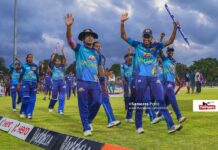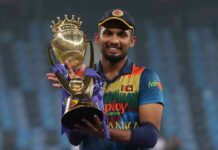Kumar Sangakkara is a proud man. He is conscious to quit when everyone is asking why and not when. That’s why he ended his captaincy stint prematurely less than two years at the helm after the 2011 ICC World Cup where he guided Sri Lanka to the final. He is set to end his career after the 2015 ICC World Cup in Australia and New Zealand, but his countrymen are urging him to stay on for a couple of more years.
Sangakkara has set the benchmark for batsmen. He is the highest run getter (11,988) in Test cricket at present among active cricketers. His Test average of 58.76 is significantly higher than those of some of the all-time greats – Sachin Tendulkar (53.78), Sir Viv Richards (50.23), Ricky Ponting (51.85), Steve Waugh (51.06), Rahul Dravid (52.31), Brian Lara (52.88) and Sunil Gavaskar (51.12).
Sangakkara has got two more Tests later this year in New Zealand and is set to go with an impeccable record that will be very hard to match for a long time.
Last week, as the selectors had talks with Sangakkara about his future, former great and one time mentor Aravinda de Silva urged the 37-year-old not to quit. Like many Sri Lankans, de Silva wants the left-hander to go on and break Sachin Tendulkar’s record for most runs in Tests.
“I am proud we Sri Lankans own some unique records,” said de Silva, Man of the Match in the 1996 World Cup. “We are only a young Test nation, but look at our records. We have scored the most runs in an innings in Test cricket. We have the highest wicket-taker in Test cricket. We won the World Cup a mere 15 years after being granted full ICC status. Some of the countries that have been playing Test cricket for over 100 years haven’t been able to accomplish these milestones. I will be a proud man if Sanga goes onto become the highest run scorer in Test cricket.”
Tendulkar retired with 15,921 runs to his name in 200 Tests and Sangakkara is 3933 runs behind the former Indian captain. And he remains hungry for runs. He is 2014’s highest run-getter in Tests with 1486 from 11 matches at an average of 74.21 with a triple-century, double-century and two hundreds. He also has nine fifties this year. Such strong form was crucial in England this summer when Sri Lanka won their first Test series there.
Sangakkara breaking Tendulkar’s record is a possibility. Given the close relationship he has with de Silva, he will think it over seriously. But there are few issues for the star batsman to consider.
Next year, Sri Lanka will host India, Pakistan and West Indies in home Tests and will tour again New Zealand. They will play ten Tests in 2015, but Sri Lanka Cricket has a notorious reputation for swapping Tests in favour of ODIs as television revenue from ODIs are higher than Tests.
From mid-2012 to mid-2013, SLC cancelled or postponed as many as ten Test matches in favour of limited-overs games. The situation isn’t ideal when your employer has a reputation of setting aside one form of the game in favour of another.
Sangakkara has already quit T20Is and will not play ODIs after the 2015 World Cup. It’s not easy when you only play one form of the game and when your employer isn’t a huge fan of that game. You train hard and motivate yourself and it becomes a bitter experience when your employer announces that there are pressing financial needs and these can be overcome only by playing more limited-overs games at the expense of Test cricket.
When he was leading the side from 2009 to 2011, Sangakkara had a frosty relationship with the administration. Some of those administrators hold powerful positions currently and he has had several run ins with them. Less than 48 hours after Sri Lanka emerged champions in the ICC World Twenty20 in Bangladesh this year, the board announced it will hold a disciplinary inquiry against him and Mahela Jayawardene for criticising a board official.
Prior to that, when Bangladesh toured Sri Lanka, Sangakkara requested the board to play a three-day warm-up game as he was returning after an injury. The game was at Matara, 150 kilometers from the capital Colombo and Sangakkara drove to the venue a day prior to the game. On the morning of the game, he was told that he was ineligible to play the game as he had not signed the contract.
Sangakkara’s famous Cowdrey Lecture at Lord’s a mere two months after he stepped down from the captaincy exposed the cricket administration in the country. “After 1996 the cricket board has been controlled and administered by a handful of well-meaning individuals either personally or by proxy, rotated in and out, depending on appointment or election,” he said during his speech that earned him a standing ovation. “Unfortunately to consolidate and perpetuate their power, they opened the door of the administration to partisan cronies that would lead to corruption and wanton waste of cricket board finances and resources.”
















